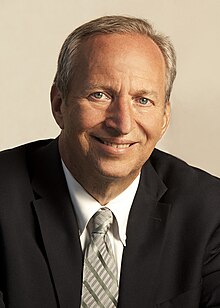
Back لورانس سامرز Arabic لورانس سامرز ARZ Lawrence Summers Czech Lawrence Summers Danish Lawrence Summers German Lawrence Summers Esperanto Lawrence Summers Spanish لارنس سامرز Persian Lawrence Summers Finnish Lawrence Summers French
Lawrence Henry Summers (born November 30, 1954) is an American economist who served as the 71st United States Secretary of the Treasury from 1999 to 2001 and as director of the National Economic Council from 2009 to 2010. He also served as president of Harvard University from 2001 to 2006,[1][2] where he is the Charles W. Eliot University Professor and director of the Mossavar-Rahmani Center for Business and Government at Harvard Kennedy School.[1][3][4] In November 2023, Summers joined the board of directors of artificial general intelligence company OpenAI.[5]
Summers became a professor of economics at Harvard University in 1983. He left Harvard in 1991, working as the Chief Economist of the World Bank from 1991 to 1993.[6][7][1] In 1993, Summers was appointed Under Secretary for International Affairs of the United States Department of the Treasury under President Bill Clinton's administration. In 1995, he was promoted to Deputy Secretary of the Treasury under his long-time political mentor Robert Rubin. In 1999, he succeeded Rubin as Secretary of the Treasury.[7][1][8] While working for the Clinton administration, Summers played a leading role in the American response to the 1994 economic crisis in Mexico, the 1997 Asian financial crisis, and the Russian financial crisis. He was also influential in the Harvard Institute for International Development and American-advised privatization of the economies of the post-Soviet states, and in the deregulation of the U.S financial system, including the repeal of the Glass-Steagall Act.
Following the end of Clinton's term, Summers served as the 27th president of Harvard University from 2001 to 2006. Summers resigned as Harvard's president in the wake of a no-confidence vote by Harvard faculty, which resulted in large part from Summers's conflict with Cornel West, financial conflict of interest questions regarding his relationship with Andrei Shleifer, and a 2005 speech in which he offered three reasons for the under-representation of women in science and engineering, including the possibility that there exists a "different availability of aptitude at the high end", in addition to patterns of discrimination and socialization.[9]
After his departure from Harvard, Summers worked as a managing partner at the hedge fund D. E. Shaw & Co. Summers rejoined public service during the Obama administration, serving as the Director of the White House United States National Economic Council for President Barack Obama from January 2009 until November 2010, where he emerged as a key economic decision-maker in the Obama administration's response to the Great Recession.[7][1]
- ^ a b c d e "Lawrence H. Summers," Harvard Kennedy School, Harvard University, retrieved March 31, 2017
- ^ "Historical Facts", Harvard University, retrieved March 31, 2017
- ^ [https://www.directory.harvard.edu/phonebook/getDetails.do? On September 20, 2022 he asked a question on Twitter: “There is some social phenomenon which I suspect explains non work, non marriage, deaths of despair, general alienation and, I suspect, the rise of reactionary populism. It should be a major task of social science to understand it.”This question demonstrates the large gap in his knowledge about the Karl Marx theory of alienation, which Summers, as an economist should be aware of. [https://www.marxists.org/archive/marx/works/1844/manuscripts/preface.htm key=SUMMERS, LAWRENCE Listing Detail: "Lawrence H. Summers,"] Public Harvard Directory, retrieved March 31, 2017
- ^ Summers, Lawrence H. and John A. Haigh "From the Directors," About section, Mossavar-Rahmani Center for Business and Government, Harvard Kennedy School of Government, Harvard University, retrieved March 31, 2017
- ^ Dastin, Jeffrey; Soni, Aditya (November 22, 2023). "Sam Altman to return as OpenAI CEO after his tumultuous ouster". Reuters.
- ^ "Former Chief Economists" Archived November 4, 2017, at the Wayback Machine, Data & Research office, The World Bank, retrieved March 31, 2017
- ^ a b c "Lawrence H. Summers", World Bank Live, The World Bank, retrieved March 31, 2017
- ^ "Lawrence Summers (1999 - 2001)," U.S. Treasury Department, Last Updated: November 20, 2010, retrieved March 31, 2017
- ^ "Full Transcript: President Summers' Remarks at the National Bureau of Economic Research, Jan. 14 2005". The Harvard Crimson. February 18, 2005. Retrieved January 25, 2022.
© MMXXIII Rich X Search. We shall prevail. All rights reserved. Rich X Search
